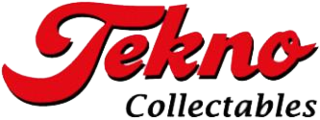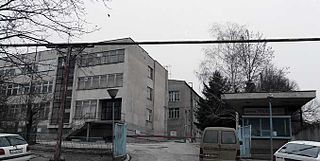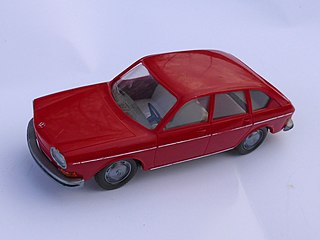Related Research Articles

A model car, or toy car, is a miniature representation of an automobile. Other miniature motor vehicles, such as trucks, buses, or even ATVs, etc. are often included in this general category. Because many miniature vehicles were originally aimed at children as playthings, there is no precise difference between a model car and a toy car, yet the word 'model' implies either assembly required or the accurate rendering of an actual vehicle at smaller scale. The kit building hobby became popular through the 1950s, while the collecting of miniatures by adults started to gain momentum around 1970. Precision-detailed miniatures made specifically for adults are a significant part of the market since the mid-1980s.

Louis Marx and Company was an American toy manufacturer in business from 1919 to 1980. They made many types of toys including tin toys, toy soldiers, toy guns, action figures, dolls, toy cars and model trains. Some of their notable toys are Rock'em Sock'em Robots, Big Wheel tricycles, Disney branded dollhouses and playsets based on TV shows like Gunsmoke. Its products were often imprinted with the slogan "One of the many Marx toys, have you all of them?"

A die-cast toy is a toy or a collectible model produced by using the die-casting method of putting molten lead, zinc alloy or plastic in a mold to produce a particular shape. Such toys are made of metal, with plastic, rubber, glass, or other machined metal parts. Wholly plastic toys are made by a similar process of injection molding, but the two methods are distinct because of the properties of the materials.

Sieper Lüdenscheid GmbH & Co. KG, mostly known by its trade name Siku, is a German manufacturer of scale models headquartered in Lüdenscheid. Some of the products sold by Siku are model cars, figurines, model aircraft, model commercial vehicles, and model agricultural machinery. Traditionally, production was centered in Lüdenscheid, but diecast models are now made in China, the Philippines, Poland, Taiwan and Vietnam.

Schuco is a German brand and former manufacturing company founded in 1912 by Heinrich Müller and the businessman Heinrich Schreyer in Nuremberg, popularly known as Germany's toy capital. The company's specialty was making toy reproductions of cars and trucks in tin, plastic and die-cast. The company went bankrupt in 1976 but was reorganized in 1993 and then totally independent again by 1996 before its acquisition by the Simba Dickie Group in 1999.

Majorette is a French toy manufacturer which mostly produces small Die-cast scale model cars, commercial vehicles, aircraft, and other vehicles, particularly in 1:64 scale. This is a normal 2.5–3 in (64–76 mm) size, thus Majorette has sometimes been called "the Matchbox of France". Traditionally, production was centered in the urban area of Lyon, but diecast models are now made in China, the Philippines, Taiwan, Thailand and Vietnam.

1:50 scale is a popular size for diecast models from European manufacturers such as Conrad, Tekno, NZG, WSI and LionToys. Typically they produce scale models of construction vehicles, tower cranes, trucks and buses. These are often the official models distributed by the manufacturers of the real vehicles as a promotional items for prospective customers. These models are also very popular in Europe despite their small size compared to stamped metal construction toys which are usually found in the US.
1:43 scale is a popular size of die-cast model cars in Europe, Asia and the US. It has its origins in the British / European O scale for model trains and the rise of certain accessories made for that scale which since have become popular in their own right. Models in this scale are 10–13 cm length.

Tekno is a Danish manufacturing company of scale model trucks and other vehicles, currently headquartered in De Lier, Netherlands. Originally established and based in Copenhagen, Tekno began manufacturing construction toys in 1928 and model vehicles immediately after World War II, selling 1 million a year during its peak.
1:18 scale diecast replicas are 1/18th the size of the real vehicle. Most popular in this category are 1:18 scale automobile replicas – usually made out of Zamak zinc diecasting alloy with plastic parts. "1:18 scale" is the colloquial reference to this class of toy or replica.

Schabak is a die-cast toy producer based in Nuremberg, Germany. The company is well known for its line of German cars and commercial airline models. The company's on and off relation with German Schuco Modell is particularly notable.

Conrad GmbH is a German manufacturer of diecast scale model trucks, primarily in 1:50 scale for use both as toys and promotional models by heavy equipment manufacturers. Conrad is one of the few European diecast companies which have not outsourced production to China or elsewhere in Asia. Conrad Modelle is headquartered in Kalchreuth, just northeast of Nuremberg.
Nürnberger Zinkdruckguß-Modelle GmbH is a German manufacturer of diecast scale models primarily in 1:50 scale for use both as toys and promotional models mainly by heavy transport and construction equipment manufacturers.

Mikro'67 is a Bulgarian manufacturing company based in Razgrad, that produces and commercialises basketball backboards, outdoor recreation goods, toys, and scale model vehicles.

Polistil S.p.A. is an Italian toy brand and former manufacturing company headquartered in Milan, with production center in Chiari, near Brescia. Polistil specialized in die-cast and plastic scale model vehicles of all sizes.

Gama is a German maker of toys, usually cars and trucks, dating from before World War I. The company is headquartered in Fürth, Bavaria, near Nürnberg, a traditional German toymaking center. Other German companies that competed with Gama Toys were Schuco Modell and Conrad Models.

Cursor Modell was a German company making models of antique and modern German vehicles. It is best known for its plastic replicas of vehicles mainly of the era 1880 to about 1920, produced for, and sold in, the Daimler-Benz museum in Stuttgart.

Kaden Nachod is the somewhat anglicized name for the Kovodružstvo Náchod toy factory in the town of Nový Hrádek in the Czech Republic. The factory, however, started making toys around 1950 when the country was still communist united Czechoslovakia.
Ziss-Modell, originally also called R. W. Modell or Wittek Modell were 'brand' names of the German Mini-Auto firm which made diecast metal classic and contemporary vehicles from the 1960s through the late 1970s. Later, use of the Mini-Auto name largely disappeared and the models were mainly known as Ziss or R. W. Modell. The company was based in Lintorf.
References
- ↑ Force 1990, p. 89.
Works cited
- Edward Force. 1990. Classic Miniature Vehicles Made in Germany. Schiffer Publications.